Students, professionals find public health inspiration at APHA’s 2021 Policy Action Institute
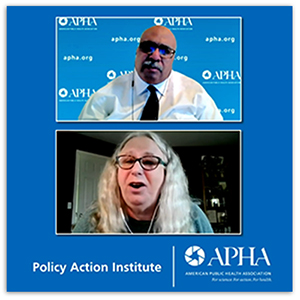 Leading public health experts, elected officials and other policymakers highlighted the connection between sound policy and public health progress during APHA’s third Policy Action Institute in April.
Leading public health experts, elected officials and other policymakers highlighted the connection between sound policy and public health progress during APHA’s third Policy Action Institute in April.
Among the hundreds of participants at the institute — which explored health equity, COVID-19, climate change and more — were about two dozen students and early-career public health professionals who received scholarships to attend the two-day virtual event.
The scholarship recipients reported coming away from the event with a renewed sense of purpose and drive for public health, citing the in-depth discussions and enthusiasm of speakers. From racism and equity to public health infrastructure and partnerships, attendees found inspiration in the broad range of topics addressed during the event.
Read and share their reports from the institute:
• Makala D. Carrington: Work, confidence, love and fun at APHA’s Policy Action Institute
• Kristin Funk: Improving public health together
• Cindy Jean-Baptiste: Partnerships, advocacy matter in public health
• Kelsey Linzell: Finding career inspiration at APHA’s Policy Action Institute
• Silicia Lomax: Collaboration, communication and care
• Fiona McEnany: Equity in public health and medicine starts with research
• Sharon Meece: Learning the layers of public health on a national scale
• Rebecca J. Molsberry: A call to bolster our public health infrastructure
• Anna Rose Moore: Finding common ground to end COVID-19 vaccine hesitancy
• Juan Jose Mejia Palacios: Involvement in the community is a catalyst to change
• Jannat Saini: Health equity important topic at Policy Action Institute
Makala D. Carrington: Work, confidence, love and fun at APHA’s Policy Action Institute
I had the honor to attend APHA’s Policy Action Institute for the second year in a row and I am so honored to have had this experience. I learned so much listening virtually from the comfort of my own home! Not only was I able to attend, I received a scholarship to subsidize the cost. I would like to share a few takeaways that I will reflect on as an early-career public health professional and graduating MPH student.
There were a lot of meaningful statements and conversations made, however, I want to highlight the following:
• Everyone will be eligible for the COVID-19 vaccine this month, Rachel Levine said. Visit WeCanDoThis.hhs.gov to sign up.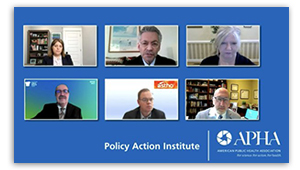
• Early-career professionals must have a positive attitude about every public health opportunity, the field is so diverse, and the opportunities are endless, according to Anne Schuchat.
• A loan repayment program for public health professionals who serve three years in a state/local health agency was highlighted during the event.
• The next six months are crucial for COVID-19 vaccination, addressing hesitancy, addressing equity. We've got a long way to go, said Michael Frasier.
• An important point was also raised: How do we ensure that we bounce forward instead of bouncing back? We must focus on each community.
• There is also a strong push for genomic surveillance to look at COVID-19 variance across the country.
• Remember that vaccines are not the silver bullet, we must continue to social distance, wear masks and use sanitation and safety precautions for prevention.
As if the conference couldn’t get any better, my favorite quote of the day would have to be: “Work hard, become as confident as you can, do what you love and have fun,” which was shared by Anne Schuchat.
I highly recommend attending the APHA Policy Action Institute for all public health change agents. This event is not solely for policy analysts, public health professionals or health care workers. This event is for those who aspire to be the change they want to see in this world.
Even though this year the event was virtual, it was an enlightening, influential and worthwhile. I am honored to have received a scholarship to attend and look forward to next year’s event.
Makala D. Carrington is a graduate research assistant at the University of North Carolina at Chapel Hill.
Kristin Funk: Improving public health together
As a scholarship recipient for APHA’s 2021 Policy Action Institute, I was humbled by the incredible agenda and speakers we would see. I came to the institute with a grateful heart. I was more than a little excited that I would be virtually rubbing elbows with such excellence. I wrote down the words I kept hearing: equity, racism, systemic, COVID-19, communities, justice.
“This is getting real,” I told myself. “We’re really going there.”
We need to go there. We came together for this institute under such dark times, talking about such ugliness. However, I was hopeful during the presentations. Hopeful, because we were having conversations about these insidious issues — and the conversations were not ugly. They were inspiring.
We are recognizing the issues, we are naming them and we are here to fix them. We heard dynamic, invigorating talks from public health champions such as Rachel Levine, Rep. Lauren Underwood, and Daniel Dawes. They modeled seamless use of inclusive language and motivated us all by affirming our presence at the institute and our agency to make change happen.
With a history of being a rurally based social worker, I usually feel like an outsider at most venues because my perspective and experiences are so unique. I did not feel that way at the Policy Action Institute. My contributions were welcomed and discussed during the All of Us networking breakout session as well as over social media. Throughout the institute and regardless of our professional or personal backgrounds, we were all speaking the same language, seeing the same barriers, and showing up committed to bolstering public health and improving lives in all of our communities.
The one word I heard most often over the two-day institute was “together.” That is exactly what I got out of this experience: none of us are in this alone and we will not ignore the systems that need to be changed. We will work together, we will make the change together, and we will get through these dark times to brighter ones — together.
I am feeling renewed and ready to return to my doctoral studies with new resources, new colleagues, and a fresh sense of community and purpose. I can feel the momentum that our time together created, and I am so ready to get to work.
Kristin Funk, LCSW, LCAC, is an outpatient therapist and is pursuing a PhD at the Indiana University–Purdue University Indianapolis School of Social Work.
Cindy Jean-Baptiste: Partnerships, advocacy matter in public health
Breaking silos is a poem we constantly recite in public health, and the vast range of topics and presenters around health and health policy made APHA’s Policy Institute a valuable experience for me. I appreciated the candor around health inequities and the emphasis on public health funding, the lack of which cripples prevention efforts and has in part contributed to the devastating effects we are currently facing with the ongoing COVID-19 pandemic.
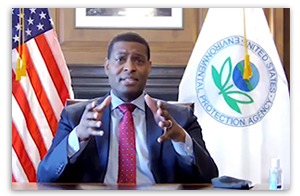
We are often faced with unavoidable barriers, for example around climate change or the political climate, so I was encouraged by the emphasis on multi-sectorial collaboration. As with other participants, I was very curious as to how we can mitigate our wanting American health care status. Often we are at the mercy of policymakers’ timelines to negotiate rules that may be overturned at the next election when a party majority flips. The current pandemic has accentuated the dire need for universal health care and timely prevention strategies, particularly for those already vulnerable due to age, socioeconomic and racial status. We need to continue to work together expanding partnerships to achieve health equity.
Attending the institute further affirmed for me that while we preach cultural competency, we need to also underscore cultural sensitivity and awareness. Additionally, how to speak about pandemic-related issues is important. For example, it’s better to say “stay-at-home” instead of “lockdown,” and “essential workers” instead of “frontline workers.” Delivery matters, and often policymakers and end users are swayed more by the packaging than the contents.
As an instructor of health policy, I believe it is important for my students to know that regulations are not created in a vacuum or in isolation. We need partnerships and advocacy, we need data, research and interventions that can be evaluated and implemented to evidence-based practices. We then need buy-in, working with stakeholders from grassroots to decisionmaking levels to influence changes in policy, environment and systems. I would love to see more grassroots community-level influencers of health invited to future institute sessions.
I am grateful and honored for the opportunity to be part of APHA’s Policy Action Institute. I am looking forward to using my capacity, as applicable, to being a champion for change and driver of health equity.
Cindy Jean-Baptiste is a public health analyst with the U.S. Department of Defense. She is also an adjunct instructor of health policy and management at a university in Massachusetts.
Kelsey Linzell: Finding career inspiration at APHA’s Policy Action Institute
As a first-time attendee of APHA’s Policy Action Institute, I walked away inspired for the future of public health and the policy actions that are possible. Each presentation provided a unique perspective and insight into a wide range of topics. While all were interesting, I want to highlight the first conversation on the second day.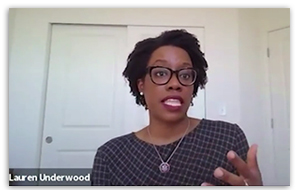
This conversation was a call to action by U.S. Rep. Lauren Underwood, D-Ill, a public health nurse. Underwood reminded all attendees of the importance of public health’s voice in local government. She defiantly stated that as public health officials, we are highly qualified to run for local health boards. It is in these positions that direct change and impact can occur. It is also in these positions — during a pandemic — that we are currently witnessing a lack of public health expertise.
The conversation between Georges Benjamin, APHA executive director, and Underwood was a personal favorite, as it exemplified how you can impact your community at any point in your career. As an early-career public health professional, I admire Underwood’s commitment to public health at the local and federal level.
Her work as a public servant and registered nurse propelled her to become the youngest Black woman to serve in Congress. She co-founded the Black Maternal Health Caucus, a group highlighting the Black maternal health crisis in the U.S., and helped implement the Affordable Care Act while serving as a senior advisor at the U.S. Department of Health and Human Services. She did all of this by age 34.
Personally, if I achieve a fraction of that by age 34, I will be very happy. As someone who loves politics and hopes to work in policy, this conversation became a personal motivation for me to continue to work toward equitable health care access for all. I do not know what my specific public health career will look like, but I will use this conversation as a reminder of why I chose this field in the first place.
I am grateful to have attended the Policy Action Institute and honored to have received a scholarship. The field of public health is very broad, and as I continue down my career path, I plan on using the information gained during the institute. Who knows? Maybe someday I will run for my local health board, too.
Kelsey Linzell is a recent graduate of the University of Nebraska-Lincoln and a public health associate in the Centers for Disease Control and Prevention’s Public Health Associate Program. Linzell contributed to Public Health Newswire and The Nation's Health in a personal capacity. The views expressed are her own and do not necessarily represent the views of CDC or the U.S. government.
Silicia Lomax: Collaboration, communication and care
APHA’s recent Policy Action Institute was one of the most inspirational virtual events since the start of the pandemic. There was a remarkable lineup of speakers, such as Frank Luntz and Montrece Ransom, as well as Rachel Levine, the U.S. assistant secretary of health, and Sen. Patty Murray, D-Wa.
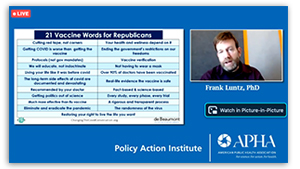 At the center of every session, whether it came from a keynote speaker, a panel or a fireside chat, was the notion that collaboration and communication were essential to the success of our public health infrastructure. Levine kicked off this sentiment by asserting the importance of collaboration through a diverse set of people working toward a common goal.
At the center of every session, whether it came from a keynote speaker, a panel or a fireside chat, was the notion that collaboration and communication were essential to the success of our public health infrastructure. Levine kicked off this sentiment by asserting the importance of collaboration through a diverse set of people working toward a common goal.
The push for collaboration also came from Montrece Ransom, who noted that “all of us must collaborate and break down the silos in our public health infrastructure.” Public health is a substantially interdisciplinary field where the paths of epidemiologists, health policy experts and community health workers typically do not cross.
In a similar vein, Anne Schuchat said that we are starting from a place of fragmentation and that we need “modernization and interoperable data systems to meet the needs of our nation’s health.” The critical take-home message was for everyone to collaborate.
There was also emphasis on effective communication in our public health efforts. One person with a profound level of expertise in this area was Luntz, who illustrated the challenges of the U.S. COVID-19 response. The political divide made a unified response practically impossible, so he conveyed the need for messaging that is intended for both sides of the aisle and the importance of using words that work. Public health communication must stop being created for a one-size-fits-all audience and should transition to developing diverse messages that are tailored to varying demographics, he said.
Another major focus was on the concept of care. The pandemic led to increased attention to health care and our response as civilians. This illustrated the need to not only care for ourselves, but also care for our neighbors as we practice social distancing and wear masks. The greatest success was marked by those expressing the greatest care. This institute provided a forum for everyone to speak to the nature of caring for one another at a deeper level and understanding that public health is a necessary force for good.
One of the most memorable quotes came from Lawrence Gostin. He said that “out of crisis comes opportunity, and there are right and wrong ways to address it.” The nation has had the opportunity for self-evaluation. This pandemic has revealed disparities long overlooked by this country’s top officials and has forced everyone to witness how essential the public health workforce is. This institute taught us that now is the time to communicate with policymakers, collaborate across public health fields and demonstrate that we care.
Silicia Lomax, MPH, is a health policy associate at Waxman Strategies in Washington, D.C., and the vice president of United Against Inequities in Disease.
Fiona McEnany: Equity in public health and medicine starts with research
Effective policy follows strong research. When research is not guided by justice, our options for equity-driven policy are limited and structural violence is reinforced.
Researchers, elected officials and nonprofit leaders gathered at APHA’s Policy Action Institute in April to discuss public health policies spanning peripartum mortality to COVID-19.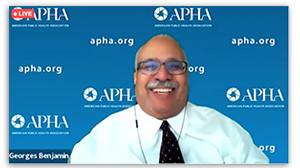
While the topics discussed addressed the wide breadth of public health research and program implementation, they had a commonality: racism. Racism is the core injustice of the American experience. Our systems support an oppressive and violent structure. Scientists, public health professionals and policymakers must collaborate to address the impacts of racism and other prejudices associated with intersecting non-centered identities. Without increased equity-focused collaboration, we will continue to use research practices, policies and program implementation strategies that obstruct transformative, justice-driven action.
Equity in public health and medicine starts with the research on which we base policies and programs. Laboratory-based — or bench— research is a critical upstream component of both public health and medicine and determines the tools available to public health professionals and medical providers. While bench experiments may not have an obvious equity component, their conception does.
Research foci determine what challenges are addressed. If a problem is not acknowledged and pursued by researchers, medical advances do not occur. The incorporation of epidemiology into experimental design is necessary to the conception of equity-driven science.
We cannot begin to address inequity at the program implementation level if conditions tied to inequity — such as asthma and HIV/AIDS— are not prioritized. Our research efforts should correspond to and be commensurate with the conditions disproportionately impacting under-resourced communities, and we will fail continuously if we pursue disjointed responses that overlook bench research and epidemiology as key partners.
Our systems are intentionally designed for performative allyship-driven diversity statements and seminars, not action. Similarly, improved hiring practices and departmental culture change focused on inclusion rather than justice are perfunctory and ultimately do not dismantle oppressive power structures at the system level.
Discussing racism and other prejudices is not an academic exercise — they are realities and should be addressed accordingly. Intellectualizing oppression without behavioral change is unethical theater. Equity-focused collaboration between bench scientists, public health researchers and practitioners, and policy makers provides an opportunity to overhaul our current system and replace it with one structurally designed to identify and address inequities using the full research-to-program implementation continuum. We can choose where we focus and what we fund, and these decisions should be driven by how we can best use our resources to create a healthier and more equitable world.
Neutrality is not an option — our science either promotes equity or reinforces oppression. A full continuum of equity-based research practices will be synergistic and more impactful than our current fragmented approach. Scientists, public health professionals, and policymakers must collaborate to identify opportunities to increase equity through scientific innovation, prioritize justice in the questions we pursue, and transform our research into action.
Fiona McEnany, MPH, is a molecular and cellular biology PhD student at Dartmouth College.
Sharon Meece: Learning the layers of public health on a national scale
When I entered the field of public health from the perspective of another career field, I viewed public health as public-spirited altruism. It was a way to give back to my community with hopes and aspirations to make a difference in others’ lives.
The last three and a half years have put me on a whirlwind of education. Through my work on quality improvement, community health assessment and community health improvement planning, I have learned that unlike my past career, this was not just about me and my inner drive. I have found public health is about systems, cultures and policies. Like peeling the layers off of an onion, for each layer you must learn what works, interacts and connects.
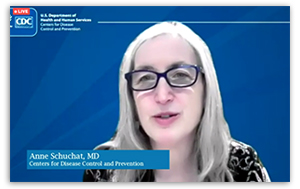 I work in a small, rural health department in the community in which I live and have raised my children. It is a community I know and have been a part of for 25 years. My work is at the core, under the layers of federal, state and local policy. My work is improving the health of a small county in Ohio where the issues affecting health are drug overdose deaths, access to health care and economic stability, all informed by the stress and anxiety of a pandemic.
I work in a small, rural health department in the community in which I live and have raised my children. It is a community I know and have been a part of for 25 years. My work is at the core, under the layers of federal, state and local policy. My work is improving the health of a small county in Ohio where the issues affecting health are drug overdose deaths, access to health care and economic stability, all informed by the stress and anxiety of a pandemic.
In April, I had the opportunity to be a part of APHA’s Policy Action Institute. This teleconference opened my eyes to the broader world of public health. The was not public health striving to improve a small county, but public health affecting the change of a nation. I heard speakers who are our nation’s leaders on health challenge one another, and challenge me to rethink public health.
The pandemic has been difficult, with tough and not-so-popular messages and decisions, but it has shed a light on public health. We are challenged to step up and think broadly. We must bring public health out from the shadows of inspections and free health care, and shine the light on the layers of policy, culture and systems that support racism and inequality.
We need to highlight relevant data and tell the story of social, political and economic determinants of health. We need to utilize that data and engage across the layers to share the facts and tell the real story of health to all sectors of our communities. These issues are not just public health’s problems to solve. The story of inequity is the problem of whole societies. We need to disaggregate our communities’ data to identify marginalized populations and actively operationalize strategies to improve health.
I have widened my view and aspirations of my responsibility as a professional in public health. I will ask why, and then ask it again and again to peel back the layers and understand the broader systemic policies that have contributed to the health of all populations in my small county in Ohio. I will not hesitate to step outside of public health, extend my hand and partner with other sectors and do the hard work to put equality back into health.
Sharon Meece is director of community health services at Henry County Health Department in Napoleon, Ohio.
Rebecca J. Molsberry: A call to bolster our public health infrastructure
At APHA’s Policy Action Institute, leaders and public health practitioners joined forces to examine important public health topics, including climate change, expanding health coverage and social determinants of health. A common theme emerged from the many calls to action, which persisted throughout the event: A priority of public health should be repairing and expanding the existing public health infrastructure.
Robust public health infrastructure is not a new concept. For decades, our public health infrastructure has been tasked with organizing, providing and evaluating public health on the local, state and national levels. While this infrastructure has been an essential component of carrying out public health responsibilities, the events of the past year — notably the COVID-19 pandemic — have exposed the cracks of a long-weakened system.
The existing workforce and information systems were not sufficient to handle a large-scale crisis of the duration and magnitude as was experienced with COVID-19. As Anne Schuchat of the Centers for Disease Control and Prevention shared, “We can get resources, but we have to be able to use them. We need systems that are nimble enough to function in a crisis — our public health entities aren’t designed that way right now. We have an opportunity to be creative and innovative.”
Although we are still not done fighting the COVID-19 pandemic, we must start looking at the immense task of building back our public health infrastructure, which we should begin addressing in three ways:
• Building back trust: One of the most evident negative impacts of the COVID-19 pandemic was wavering public support for public health. The existing infrastructure was not ready for the crisis that evolved. As Lawerence Gostin, director of the O’Neil Institute, explained to the attendees, “We undermined science. We undermined public health. And therefore, we never got the public's trust. And so this virus got the best of us.” Taking deliberate steps to prevent and prepare for future health crises will be a critical step in rebuilding trust.
• Expanding funding for public health infrastructure: In addition to improved trust, public health infrastructure needs increased and consistent funding. Over the last several decades, public health systems and personnel have experienced cuts, as well as the shifts that occur with changing political parties in office. To adequately address public health needs, communities require funds to provide comprehensive resources and support.
• Prioritizing public health equity: Finally, public health infrastructure must prioritize health equity endeavors throughout the rebuilding process. Socioeconomic factors, such as income, race and ethnicity, can lead to disparate health outcomes, evidenced by the inequalities in COVID-19 mortality and vaccine distribution. Daniel Dawes of the Satcher Health Leadership Institute, said that “The people who are closest to the pain, closest to the problems, should be the ones leading the solutions, and we should be working with them to advance the cause.”
The last year's events have proven that the existing public health infrastructure is not sufficient; however, change will occur when rebuilding is a priority.
Rebecca J. Molsberry, MPH, is a population health and data systems analyst at Meadows Mental Health Policy Institute in Dallas. She is also a PhD candidate in epidemiology at the University of Texas Health Science Center’s School of Public Health.
Anna Rose Moore: Finding common ground to end COVID-19 vaccine hesitancy
APHA’s Policy Action Institute highlighted the need for effective communication regarding the COVID-19 vaccine. Unfortunately, vaccine hesitancy is a phenomenon that public health practitioners are well acquainted with. It is important to recognize the present-day reality that misinformation surrounding vaccines is rampant. In light of the COVID-19 pandemic, the field of public health has never had a clearer call to action than to effectively address vaccine concerns and communicate vaccine safety.
It comes as no surprise that vaccination has become highly political. The politicization of COVID-19 vaccines can lead to breakdown in communication. Interestingly enough, political party affiliation can determine the best messaging to use when communicating about the COVID-19 vaccine. The APHA Policy Action Institute welcomed pollster Frank Luntz as he explained how to best communicate across the political aisle when speaking about the COVID-19 vaccine.
Effective communication is critical when addressing COVID-19 vaccination concerns. Luntz explained that determining the most effective language is largely dependent on the target audience’s political identity. For Democrats, using the appeals of fact-based or science-based are highly effective. For Republicans, it is emphasizing freedom or local control.
While addressing COVID-19 vaccines in general is of importance, it is also helpful to focus on specific issues regarding vaccination. For example, appealing to a person’s political affiliation is useful. To illustrate this, some people are hesitant because of the speed of vaccine development. If a Republican were to voice this opinion, it can be explained that red tape was cut, but corners were not. If a Democrat were to express this concern, it can be explained that the science behind the vaccine is not new.
Another point made by Luntz was the importance in messaging to the public. He explained that people trust information they get from their doctor significantly more than any celebrity, politician or public figure. This was notable, as public health professionals can take this into consideration when developing social marketing campaigns for COVID-19 vaccines.
Public health professionals must recognize the key role they play in changing the conversation around the COVID-19 vaccine. While utilizing party specific language can be largely beneficial, the message is the same for both sides. It can be difficult, and downright discouraging, to hear vaccination concerns.
By allowing discourse and for others to express their apprehension about vaccines, public health professionals can directly address the safety and efficacy. Public health professionals must realize the significance of concerns. While it can be easy to dismiss some concerns on the grounds that they are not scientifically accurate, they are perceived as real threats by some people. It is critical that public health professionals realize this and have an empathetic approach. Effective communication is at the heart of changing the way we talk about COVID-19 vaccines.
Political parties aside, there must agreement to a common goal: to end the COVID-19 pandemic. Vaccination allows the light at the end of the tunnel to grow brighter with every passing day.
Anna Rose Moore is a second-year Masters of Public Health student at Georgia Southern University.
Juan Jose Mejia Palacios: Involvement in the community is a catalyst to change
The central theme of APHA’s 2021 Policy Action Institute was drive.
Throughout the institute, panelists and speakers gave encouraging words to the attendees. They also said that students are the future of public health. As a student myself, it is challenging to create a change within my community. Attending the institute made me rethink my approach in the field and reminded me about my values — service, teaching, harmony and culture.
When reflecting on my experience at the institute, I came to two realizations. These realizations made me rethink my approach within my field and take action. The first realization was that everything has its process. Before the institute, I lost my drive to engage with my community. I stopped volunteering with my local nonprofit organizations, discontinued reading about the organizations and minimized talking with my classmates about community action. The second realization was that one person could make a difference, but a group can do more. Before the institute, I would mainly work alone on health projects.
After attending the institute, I regained my drive by listening to the encouraging words of the speakers and panelists. The way they spoke and relayed their messages was the boost I needed. I also realized that I can only do a limited amount of work within a day. However, working as a team is beneficial, but new skills can be learned and strengthened. I plan to reconnect and network with those in my community and other originations. At the end of the institute, I felt more energized and prepared for summer volunteering.
It was a great reminder of how the field of public health is a process. There will be an obstacle in the road, but losing faith in the process is not an option. In general, the field of public health has been underfunded throughout the years. However, it is the values and drive of those in the area that make it thrive.
In my journey in the field of public health, nonprofit organizations played a critical role. The guidance and mentorship of the One Future Coachella Valley staff gave me the drive to continue in the field. They strongly recommended that I become a member of APHA and Academy Health. By joining these organizations, I got out of my comfort zone and learned more about the process of public health.
For the students in the field, I recommend getting out of your comfort zone and engage with your target community. Take the time to learn about the community you want to serve. In my experience in public health, getting to understand the community is critical to creating a change.
Juan Jose Mejia Palacios is a master’s student at the City University of New York, studying global and migrant health policy.
Jannat Saini: Health equity important topic at Policy Action Institute
APHA’s third annual Policy Action Institute was a timely and necessary dialogue with an emphasis on health equity. Incidentally, it also coincided with the Centers for Disease Control and Prevention’s declaration of structural and interpersonal racism as a threat to the health of communities of color.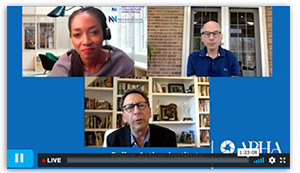
Participation in the institute was a rewarding experience for me. This was largely because one of the focal points of the two-day institute was inspiring legislative action. Both days involved thought-provoking discussions on issues such as equitable distribution of the COVID-19 vaccines, criminal justice, climate change and beyond. Speakers presented a diversity of thought and knowledge, underpinned by a shared message of equity and justice, and the urgent need for investing in public health.
Public policy and politics brought these themes together. This was particularly evident in the keynote speeches and panel discussions. Panel discussions that stood out to me included policy priorities for building a robust public health system and expanding coverage and access to care. For me, a key take-home message from these exchanges was the importance of translating public health scholarship to actionable policies.
The Black Maternal Health Caucus, spearheaded by Reps. Lauren Underwood, D-Ill. and Alma Adams, D-N.C., is an initiative that embodies that message. The caucus seeks to elevate the Black maternal health crisis and advance policy solutions to save lives. I was so inspired by learning about the caucus from Underwood, a keynote speaker at the institute and a public health nurse by profession. As a student of health services research conducting pregnancy-related work, I am particularly concerned by the disparities in outcomes for Black birthing persons and other communities of color. Underwood’s talk detailing the “Momnibus” legislation and how to get involved in the effort was especially impactful to me.
Another noteworthy point made throughout the institute was the need for multidisciplinary collaboration to achieve population health equity. Social determinants such as housing, education, employment and, as Daniel Dawes pointed out, political determinants — voting, government, policy — intersect with structural racism as drivers of community health in the U.S. The institute sessions highlighted the need to break the silos, and how to work across disciplines to advocate for the health of systemically under-resourced communities. We also discussed intersectionality, such as how different forms of inequality operate together, and how it is substantive to addressing determinants of health.
Addressing the question of optimal public health policies, Lawrence Gostin sais that “This whole conversation starts and ends with equity and justice.” I wholeheartedly agree. I felt impassioned as an advocate after attending the 2021 institue, and hope to take the conversation forward in my research and, most importantly, in my actions. Lastly, I would like to thank APHA for its generous scholarship and the opportunity to participate in the institute this year.
Jannat Saini is a PhD student in the Department of Pharmaceutical Health Services Research at the University of Maryland School of Pharmacy. She is a board member-at-large and Membership Committee chair for the Maryland Public Health Association.
For more information on the Policy Action Institute, visit the APHA website. To watch recordings from the institute, visit APHA Now.
Photo credits
Georges Benjamin, MD, APHA executive director, speaks with Rachel Levine, MD, assistant secretary for health for the U.S. Department of Health and Human Services; panelists discuss policy priorities for a robust health system during the first day of the Policy Action Institute; Michael Regan, MPA, administrator of the U.S. Environmental Protection Agency, speaks about climate change and other environmental health issues; U.S. Rep Lauren Underwood, D-Ill., discusses health disparities; pollster Frank Luntz, PhD, discusses communications on COVID-19 vaccination; Georges Benjamin, MD, APHA executive director, leads the APHA Policy Action Institute; Anne Schuchat, MD, principal deputy director of the Centers for Disease Control and Prevention, speaks at an institute session on COVID-19; a panel of experts talks about what’s ahead for public health. All photos by The Nation’s Health staff.


